| In Jalalabad, hope is fading |
|
| Source: |
Le Monde Diplomatique |
By: |
Chris Sands |
|
The names of dead Taliban commanders are painted beside the highway that runs east from Kabul, fighters killed as the movement last converged on Afghanistan’s capital in the 1990s. Further along the road, the tarmac is burnt black from their recent attacks against military supply convoys. Animal carcasses lie in the dust as lorries laden down with equipment travel from Pakistan, often escorted by armed private contractors.
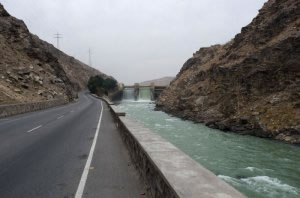
The main highway between Kabul and Jalalabad goes through the district of Surobi. It was there in August 2008 that ten French soldiers were killed in an ambush.
Then Jalalabad emerges in the late autumn sunshine, stretching out beneath the mountains, amidst tree-lined streets and fields of green. The city is still relatively safe compared with the rest of the region, but the signs of war are visible. Drones fly in the clear blue sky and the occasional American soldier can be seen manning the gun turret of a Humvee.
Even in the more stable parts of the country, discontent is now growing and there is a suffocating sense that Afghanistan is getting smaller and smaller as more areas fall into chaos and insecurity.
In a local Jalalabad park at sunset, friends milled around, chatting or watching boxers spar during a training a session. Many of them were students, well educated and able to speak broken English. On the face of it, they were exactly the kind of people France, Britain, Canada and the US continue to invest their long-term hope in.
What did they have to say? “The situation will not get better because the current government is democratic. As Afghans and Muslims we will never accept a democratic government. I want an Islamic government,” said Mahaz-u-Rahman, 23. “We had that under the Taliban and under the mujahideen.” His views were far from unusual. Ansar Ullah, 19, talked fondly of life before the invasion, when “we were very poor but we had security and peace”. Sayed Nasratullah Hashimi, 21, said: “American forces have attacked the Pashtun people” in Afghanistan and Pakistan.
Less than a week earlier, Barack Obama had unveiled his long-awaited strategy for the war. It could hardly have been further removed from the lives of those men and the reality of that evening. During the speech delivered to West Point military academy, in New York state, the US president had tried to reassure both the domestic and international audience that an end was in sight. Comparisons with Vietnam were “a false reading of history”, he said, but another 30,000 more troops would be needed to “break the Taliban’s momentum”. Beneath the rhetoric lay a plan fraught with danger that could ultimately suck the West deeper into unwinnable and increasingly bloody conflict.
Tribe comes first
It needn’t have been like this. Jalalabad is the capital of Nangarhar – the province where Osama bin Laden melted away from the Tora Bora mountains and across the border into neighbouring Pakistan. Thousands of Afghans and hundreds of foreign troops have died since then and after years of quiet, the area around his old hideout is again the scene of intermittent fighting.
The Taliban, though, are not as strong here as in other parts of eastern Afghanistan and the people are not hardcore supporters of the insurgency. Instead, everything is subservient to their tribe. In some cases, that means the rebels, the government and the foreign troops are all essentially outsiders who cannot be trusted.
One afternoon Haji Malik Niaz was sitting at home in Nangarhar’s Mahmand Valley when his village came under attack and his nephew was abducted. He fought back and a fierce battle ensued. By the end of it, the Taliban had killed two of his men. In return, he had killed three of theirs and captured another 11. He handed over eight to the government and exchanged the rest in return for his nephew. The only people who can bring peace to the country, Niaz believes, are his fellow elders. To illustrate the point, he recalled what happened the last time foreign soldiers tried to enter his domain. “A helicopter wanted to land, somebody shot at it and broke one of its rotor blades, so they left very quickly. They are all women – they can’t come to our village,” he said, laughing.
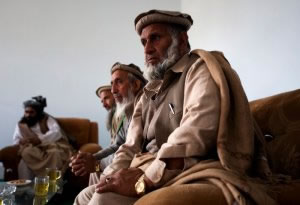
Tribal elders from the provinces of Nangarhar, Kunar, Nuristan and Laghman have formed the Eastern Region Peace and Development Jirga in an effort to combat growing Taliban influence.
Niaz added that he wanted to be armed and funded by the international community in his fight against the Taliban. He later got his wish when the US pledged to help his tribe with $1m fund and $200,000 in employment programmes. Community militias have also been established elsewhere.
The problem is that allegiances can change quickly when so much is at stake and people are dying every day. In another nearby part of Nangarhar, villagers who once opposed the Taliban are now openly calling for resistance against the US. The reason is simple: in July 2008, 47 of them were killed in an air strike on a local wedding party. Haji Gul Zarin, whose nephew was due to be married that day, said body parts had been scattered around, some burnt so badly they were like “kebabs on sticks”.
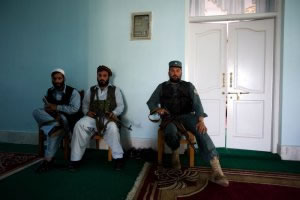
Bodyguards and police are assigned to help protect the jirga’s meetings. The US recently agreed to fund the Shinwari tribe of Nangarhar in an effort to keep the Taliban out of the area.
His tribe had previously fought against the insurgents and imposed a system where any household caught harbouring a rebel was fined – just the kind of deal the US has started to support financially. Everything has changed since then. “The Americans do not act like the Russians, they act like the British. They say they are our friends then they come and kill our families,” he said. “We don’t need any more time. Right now all Afghans oppose the Americans and are prepared to fight them and their allies.”
The size of the occupation has been steadily increasing for a while now, but the footprint has grown bigger, and faster, since Obama took office – just as he suggested it would during his presidential campaign.
The plan he unveiled in December was, in fact, his second strategy for Afghanistan. The first involved sending 21,000 additional troops and it ushered in the bloodiest period of the entire conflict. Record numbers of soldiers and civilians died last year and, for all the talk in Washington and London about progress, the situation became worse for ordinary people across large swathes of the country. Any minor gains in one village or district were overshadowed by significant losses in another and insecurity spread to new areas, most noticeably taking root in the north.
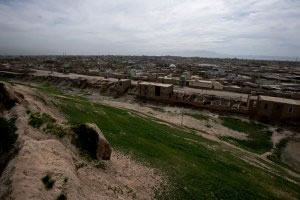
Kunduz, in northern Afghanistan, is a stronghold of the insurgents, who control large swathes of the countryside there.
The government can do nothing
The danger signs were obvious in Kunduz, a province bordering Tajikistan, last March. On a hilltop overlooking the city there, a policeman described the anarchy near his home in the countryside where “the government can do nothing”. People reeled off the names of places where violence was rising, and the deputy governor warned that the US could face stronger resistance than the Soviets. “America is a selfish country,” he declared. But only after another disastrous air strike that summer on two stolen fuel tankers had killed scores of civilians, did anyone pay attention.
The war’s wreckage also continued to wash up in Kabul. A refugee camp had been developing for some time on the capital’s outskirts, but in 2009 those who arrived there had completely abandoned hope of returning south. The extent of the misery they fled was evident in the mud, squalor and excrement they ran away to, the photographs of the dead children they carried and the stories they brought with them.
“Even if all of America and all of Nato come to Afghanistan, they will not stop the fighting with the Taliban. They will bring a lot of bloodshed and kill a lot of people. The one way forward is for them to talk to the Taliban,” said Rahmatullah, from Sangin district, in Helmand. Abdul Mohammed, from Kandahar, added: “Everybody comes and gives a lot of promises that they will bring justice and peace, but then they do the opposite.”
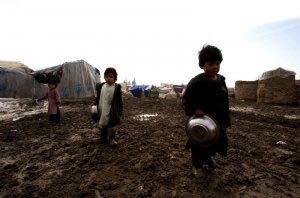
Refugees from southern Afghanistan continue to arrive at this camp on the outskirts of Kabul, bringing with them tales of violence and devastation.The war arrived in Kabul in other ways.
There were rocket strikes, suicide bombings and highly co-ordinated assaults on government buildings. Walls around compounds grew taller and the checkpoints more frequent, but the insurgents always found vulnerable points.
When UN election workers were fatally attacked in their guesthouse it led to international condemnation and an exodus of the organisation’s staff. A week-and-a-half later, a severed leg was still in the building’s courtyard.
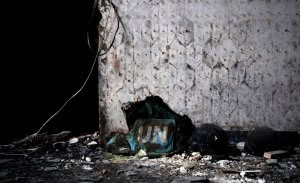
The Taliban’s attack on this guest house in Kabul led to an exodus of UN workers from Afghanistan. Rebels increasingly see aid groups as legitimate targets.
Each year is billed as pivotal by western powers and 2010 will be no different. Now, however, the stakes are going to be much higher. There will be around 100,000 US troops in Afghanistan when Obama’s surge is complete, along with tens of thousands of Nato soldiers and unknown numbers of private contractors.
However hard the White House tries to deny it, the shadow of history looms over all of this. Just as in Vietnam, escalation is seen as the only way out. But by the first drawdown date of July 2011 – mentioned in Obama’s strategy speech – the US and its allies will almost certainly face a stronger insurgency.
They will have propped up a corrupt government for another 18 months and caused further suffering to a civilian population that has a proud tradition of resisting foreign occupation. In pulling back to the cities and towns, they will cede ground to the rebels, leaving themselves isolated and exposed, just as the Soviets did in Afghanistan all those years ago. Minority ethnic groups may then feel they have no choice but to fight and a new era of brutal sectarian violence could be inevitable.
There is very little hope left. The cards have been dealt and, while people are praying peace will result, they are expecting the worst. “You work hard in your country, you pay tax, and the government wants to spend that. They don’t care about your blood, your soldiers. They don’t care about your reputation. You will lose the war like Russia, you know that?” said an Afghan official who wished to remain anonymous.
“The communists took power and abused people, so a space appeared between the government and the people, and the people started a war or left the country. If they stayed, they were in the mountains, to fight, or to die. And what happened to the Russians? The same thing is happening right now.”
|